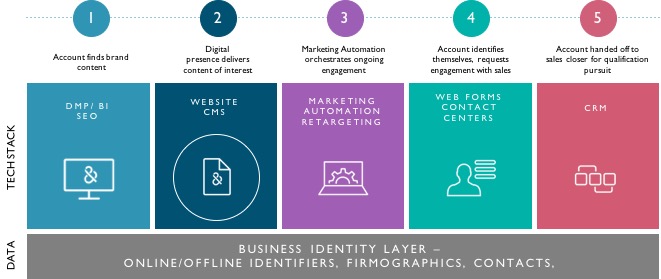3 Reasons You Need an Identity Key
In today’s omnichannel, cross-platform world, it’s easier than ever for companies to connect with their customers and prospects, but the interesting paradox is that it is extremely hard to do so in a meaningful way. Not only must brands develop engaging content that stands out from the competition, they need to ensure the right message is delivered to the right person at the right time and in the right context. While that might sound cliché, it’s as critical as ever.
In order to deliver a truly compelling message to your target audience, it’s important to:
- Decide the organization (account) you want to target
- Identify the individual you want to deliver the message to
- Understand how the individual fits into their respective organization
By understanding their unique roles and responsibilities, and where they fall within the hierarchy of an organization, you’ll have a better sense of how to tailor the message to meet their specific needs.
While there is copious information (firmographic and technographic data on companies, behavioral and intent data from web, mobile, event engagements, and content consumption analysis) available to help B2B marketers better understand their prospect accounts and target personas, many marketers find it difficult to stitch the pieces together to effectively deliver their message.
According to a recent study of over 250 B2B organizations, marketers struggle to turn their abundant customer data into actionable insights that help them identify and target the right individual at the right account. Some interesting findings uncovered in the report were:
- Only half of marketers are confident in the quality of their data
- Over two-thirds (70%) are not confident in being able to identify anonymous traffic
- Fifty-six percent said it’s very difficult to align sales and marketing data about companies and contacts when executing programs across multiple channels
In our increasingly digital world, where a large percentage of interactions between B2B marketers and their prospects and customers are online and anonymized, the data management challenge is only a small part of the complexity the marketer faces. Even if marketers are able to aggregate customer information from their digital properties and CRMs, they still need a way to manage identity. Effective identity management allows marketers to pinpoint – with a relatively high degree of certainty – a specific asset, an individual, a company, or an organization from amongst a set of many such entities that may look alike or are presented in an anonymized manner.
Why Marketers Need Identity Management
According to a recent Winterberry Group study, just 15% of marketers say they can consistently recognize audiences across channels, even as they spend almost $900 million this year on services and solutions to the problem.
Given the overload of information and marketing messages most people are subjected to nowadays, being able to understand and manage identity becomes even more critical. In order to ensure that they are not desensitizing customers and prospects to their messages, marketers need to control the frequency of interaction with them. Knowing when you’re reaching the same individual across different channels and platforms is crucial in ensuring you can continually engage with them wherever they are, rather than hoping they will present themselves in a given channel. Access to the proper measurement and attribution models then becomes very important, as it’s impossible to effectively engage individuals without knowing how many unique entities you have interacted with and where you interacted with them. This is where the concept of a universal identifier comes in.
The idea behind assigning a universal identifier, or identity key, is to solve for the need of having a unique (differentiated from others), consistent (does not change over time), and persistent (does not change across different devices/systems/platforms/channels) identifier so that you can interact with your customers and prospects through specific messaging or track their actions across various systems, channels, and platforms with the intention of gleaning insight into them.
With the proliferation of marketing systems and platforms, many different identities are associated with a single individual. For example, a person can be identified as an email, a cookie (actually many cookies from different browsers across different websites), a mobile device ID, IP addresses, and other login IDs. Given that all these disparate identities represent a single person, the concept of “managing” identity becomes important. Having a universal identifier allows these individual identities to be linked together, which in turn allows marketers to build one holistic view of the person. In the B2B context, this view at the individual level is then connected to the company and finally rolled up to an account level, so marketers can see all activity within each target account.
Getting Started With Identity Management
Managing identity starts with deciding on a unique, consistent, persistent key that you can associate with both your online and offline interactions. An example is the Dun & Bradstreet D-U-N-S® Number, which often already exists in your CRM systems and marketing automation platforms and can also be attached to cookies and device IDs. Next, you can begin to plan for your data management and data governance processes to use this key across all your systems. This will allow you to use a single identity key when managing your data acquisition, collection, and aggregation processes.

An identity management framework and a universal identifier help to efficiently manage the customer journey
Three Benefits of B2B Identity
Without having an identity management framework and without that universal identity key, you have no way of confidently knowing you’re targeting the right audience. And without that clarity, your campaign effectiveness and ROI can suffer. Here are three big reasons to start thinking about getting started with identity management today:
- Understanding identity allows for better execution of site personalization and other lead conversion tactics, helping to close sales faster
- Understanding identity helps in managing the performance of your campaigns, resulting in improved efficiency of marketing spend and increased ROI
- Understanding identity helps drive better data collection and governance practices, allowing you to do more with the data you have
Leveraging the right universal identifier will give you the real insights and help you market with confidence.

